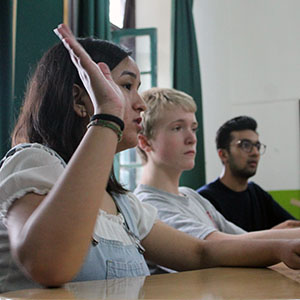
IB Diploma Courses
Diploma Subject Groups
Group 1: Studies in Language and Literature
- English A: Language and Literature – HL & SL
- English A: Literature – HL & SL
- Korean A: Literature – SL
- Language A: Self-Taught School Supported – SSST – (SL)
- Dzongkha A: Literature
Group 2: Language Acquisition
- French B: Language – HL & SL
- Spanish B: Language – HL & SL
- Hindi B: Language – HL & SL
- French Ab Initio – SL only
- Spanish Ab Initio – SL only
Language B – HL & SL
Language Ab Initio – SL
Group 3: Individuals and Societies
Group 4: Sciences
- Physics – HL & SL ***
- Chemistry – HL & SL ***
- Biology – HL & SL ***
- Environmental Systems & Societies – HL & SL
- Computer Science – HL & SL ***
Group 5: Mathematics
- Mathematics: Analysis and Approaches – HL & SL
- Mathematics: Applications and Interpretation – HL & SL
Group 6: The Arts
Diploma Programme Core
Woodstock School is an International Baccalaureate (IB) World School offering the Middle Years Programme (MYP) and Diploma Programme (DP).
Woodstock is an IB World School. These are schools that share a common philosophy — a commitment to high quality, challenging, international education that Woodstock School believes is important for our students. For further information about the IB and its programmes, visit http://www.ibo.org
Please note:
Course availability is pending subject demand, minimum enrollments, and timetabling constraints. Students are advised to choose first and second choice subjects in each subject group.
* As an interdisciplinary subject, Environmental Systems and Societies (ESS) satisfies requirements for both group 4 (the experimental sciences) and group 3 (individuals and societies). ESS students may therefore choose another subject from any of the six groups (including another group 3 or 4 subject). ESS is offered only at the Standard Level (SL).
** DP History and Theatre are not being offered by Woodstock School in the 2022-23 academic year.
*** Some DP subject briefs have changed for students starting DP1 in August 2023. Click here for subject briefs for the 2023-23 academic year.
Group 1: Studies in Language & Literature
Group 2: Language acquisition
Group 3: Individuals and society
Group 4: Science
Group 5: Mathematics
Group 6: The Arts
Course Guidance for Further Education
The following documents can help you choose the right courses depending on which subjects students are considering studying at university or college.
- Recommendations of which subjects to consider based on further education ambitions: IB Subject Recommendations
- Details of university and college requirements by subject and region: Matrix of IB Subject Prerequisites by Major and Region
Indian Medical Pathway for IB students
To prevent unnecessary pressure on their well-being, Indian students preparing for medical study within India are ineligible to earn the full IB Diploma while at Woodstock. Instead, we offer an alternative pathway to enable Indian students enrolled at Woodstock to pursue medicine. Find out more about the alternative pathway for students who are considering studying medicine in India.
Diploma Pathways

Learn more about the two pathways to graduating with a U.S. high school diploma at Woodstock.

 Woodstock offers the following IB Diploma Courses to students in Grades 11 and 12.
Woodstock offers the following IB Diploma Courses to students in Grades 11 and 12.